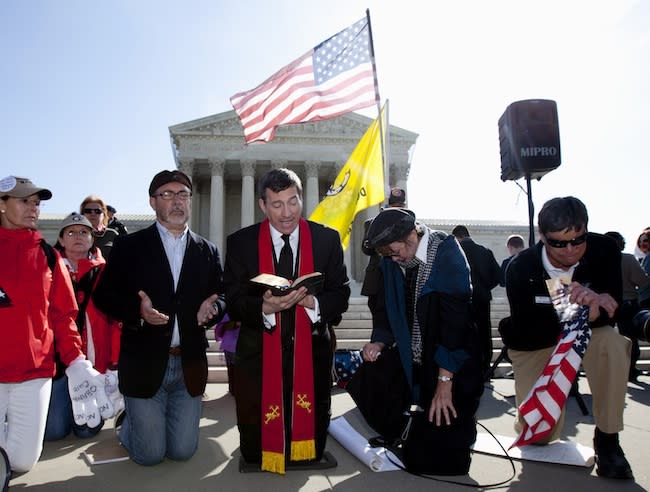 The Lookout
The Lookout‘FantasySCOTUS,’ a Supreme Court fantasy league, has players split over health care mandate

On Monday, President Barack Obama joined the swirl of speculation surrounding the Supreme Court's health care deliberations by predicting the court will uphold his signature law. "Ultimately, I'm confident that the Supreme Court will not take what would be an unprecedented, extraordinary step of overturning a law that was passed by a strong majority of a democratically elected Congress," he told reporters.
But hold off on wagering the farm just yet. Individual predictions about which way the secretive and historically leak-free Supreme Court will rule are famously unreliable. Obama, constitutional law background and political motivations aside, is just as likely to be surprised by the outcome in June as the rest of us.
That hasn't stopped people from trying to read the tea leaves. The health care decision is one of the most active bets on Intrade, an online trading exchange website where people bet money on the outcomes of non-sports-related future events. Right now Intrade is giving 61 percent odds that the Supreme Court will strike down the individual mandate.
Our Signal blogger David Rothschild writes that the wide range people are willing to pay on the site to buy or sell a bid shows just how little is known about the case's outcome. In elections and other events where more information is available—such as polls—the prices tend to be stabler. What's more, some of Intrade's previous court-related predictions, like who would be nominated to replace Justice John Paul Stevens on the Supreme Court, have been very wrong.
That's why true legal nerds have a prediction market all their own, called FantasySCOTUS, where players earn points and bragging rights, not money, when they correctly forecast the Supreme Court's decisions. It's a fantasy league for the legal set. In 2009, the most active FantasySCOTUS players predicted 75 percent of that year's 81 cases correctly, according to a paper written by the site's founders. (The Harlan Institute, a nonprofit that aims to educate high school students about the Constitution, created FantasySCOTUS in 2009.)
The site's founders say that FantasySCOTUS is more reliable for predicting Supreme Court rulings than Intrade because people who bet on Intrade tend to be political junkies, while those who place wagers on FantasySCOTUS are actual court watchers, even though they don't necessarily all have law degrees.
Of the top-ranked players on FantasySCOTUS, 55 percent currently predict that the individual mandate will be upheld. But looking at all the players on the site together reveals a split of 52-48, with a slight majority calculating the mandate will fall. Unfortunately, we can't rely on the site's "chief justice," the nickname for the top-ranked player, because he hasn't yet wagered on the individual mandate.
So why the split decisions between FantasySCOTUS and Intrade?
Corey Carpenter, a third-year law student at George Mason University and an analyst for the Harlan Institute, tells Yahoo News that after oral arguments started, and pundits began warning that the justices seemed unconvinced by the government's argument, the odds that the court would strike down the mandate shot up quickly on Intrade, from 47 to 61 percent. Perhaps the betting public had just watched New Yorker writer Jeffrey Toobin emerge from the courthouse and tell CNN that the arguments had been a "train wreck" for the Obama administration.
But these statements and fluctuations of opinion probably had less influence on FantasySCOTUS players, since many participants read the briefs and make their own decisions, instead of relying on media reports. Before oral arguments, FantasySCOTUS players were split 50-50 on whether the mandate would fall. After the third day, the odds rose slightly for a rejection of the mandate, to 52 percent.
"We have a core of dedicated users that take it very seriously," Carpenter said. About 220 users voted on the individual mandate out of the roughly 12,000 players on the site.
Ten years ago, people eager to learn the outcome of court cases didn't have to rely on the futures markets to predict Supreme Court cases. They had another tool: a computer program that used decision trees and information about the justices' voting records to forecast rulings. In 2002, this program, called the Supreme Court Forecasting Project, predicted 75 percent of cases correctly, while a panel of Supreme Court experts accurately predicted less than 60 percent, according to an article in the Columbia Law Review. However, the program stopped working so well when a slew of justices retired, since it relied on plugging in judges' past decisions into the program. For today, FantasySCOTUS just might be the most accurate bet.
More popular Yahoo! News stories:
• Mitt Romney gets personal on the campaign trail in hopes of connecting with voters

